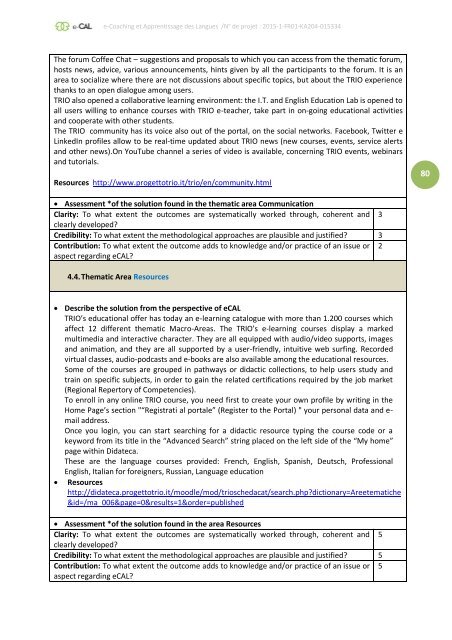e-CAL - e-Coaching et Apprentissage des Langues
The ERASMUS+ project e-CAL presents the result of an analysis of support methods in the case of language learning using web-based Open Educational Resources (OER).
The ERASMUS+ project e-CAL presents the result of an analysis of support methods in the case of language learning using web-based Open Educational Resources (OER).
Create successful ePaper yourself
Turn your PDF publications into a flip-book with our unique Google optimized e-Paper software.
e-<strong>Coaching</strong> <strong>et</strong> <strong>Apprentissage</strong> <strong>des</strong> <strong>Langues</strong> /N° de proj<strong>et</strong> : 2015-1-FR01-KA204-015334<br />
The forum Coffee Chat – suggestions and proposals to which you can access from the thematic forum,<br />
hosts news, advice, various announcements, hints given by all the participants to the forum. It is an<br />
area to socialize where there are not discussions about specific topics, but about the TRIO experience<br />
thanks to an open dialogue among users.<br />
TRIO also opened a collaborative learning environment: the I.T. and English Education Lab is opened to<br />
all users willing to enhance courses with TRIO e-teacher, take part in on-going educational activities<br />
and cooperate with other students.<br />
The TRIO community has its voice also out of the portal, on the social n<strong>et</strong>works. Facebook, Twitter e<br />
LinkedIn profiles allow to be real-time updated about TRIO news (new courses, events, service alerts<br />
and other news).On YouTube channel a series of video is available, concerning TRIO events, webinars<br />
and tutorials.<br />
Resources http://www.prog<strong>et</strong>totrio.it/trio/en/community.html<br />
80<br />
Assessment *of the solution found in the thematic area Communication<br />
Clarity: To what extent the outcomes are systematically worked through, coherent and 3<br />
clearly developed?<br />
Credibility: To what extent the m<strong>et</strong>hodological approaches are plausible and justified? 3<br />
Contribution: To what extent the outcome adds to knowledge and/or practice of an issue or 2<br />
aspect regarding e<strong>CAL</strong>?<br />
4.4. Thematic Area Resources<br />
Describe the solution from the perspective of e<strong>CAL</strong><br />
TRIO’s educational offer has today an e-learning catalogue with more than 1.200 courses which<br />
affect 12 different thematic Macro-Areas. The TRIO’s e-learning courses display a marked<br />
multimedia and interactive character. They are all equipped with audio/video supports, images<br />
and animation, and they are all supported by a user-friendly, intuitive web surfing. Recorded<br />
virtual classes, audio-podcasts and e-books are also available among the educational resources.<br />
Some of the courses are grouped in pathways or didactic collections, to help users study and<br />
train on specific subjects, in order to gain the related certifications required by the job mark<strong>et</strong><br />
(Regional Repertory of Comp<strong>et</strong>encies).<br />
To enroll in any online TRIO course, you need first to create your own profile by writing in the<br />
Home Page’s section "“Registrati al portale” (Register to the Portal) " your personal data and e-<br />
mail address.<br />
Once you login, you can start searching for a didactic resource typing the course code or a<br />
keyword from its title in the “Advanced Search” string placed on the left side of the “My home”<br />
page within Didateca.<br />
These are the language courses provided: French, English, Spanish, Deutsch, Professional<br />
English, Italian for foreigners, Russian, Language education<br />
Resources<br />
http://didateca.prog<strong>et</strong>totrio.it/moodle/mod/trioschedacat/search.php?dictionary=Are<strong>et</strong>ematiche<br />
&id=/ma_006&page=0&results=1&order=published<br />
Assessment *of the solution found in the area Resources<br />
Clarity: To what extent the outcomes are systematically worked through, coherent and 5<br />
clearly developed?<br />
Credibility: To what extent the m<strong>et</strong>hodological approaches are plausible and justified? 5<br />
Contribution: To what extent the outcome adds to knowledge and/or practice of an issue or 5<br />
aspect regarding e<strong>CAL</strong>?


